Social Issues →
→
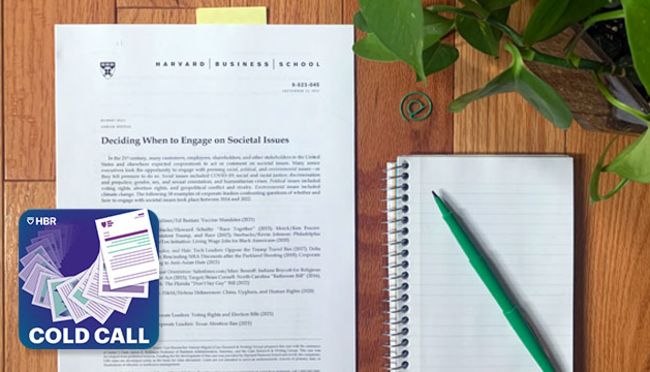
- 02 Jan 2024
- Cold Call Podcast
Should Businesses Take a Stand on Societal Issues?
Should businesses take a stand for or against particular societal issues? And how should leaders determine when and how to engage on these sensitive matters? Harvard Business School Senior Lecturer Hubert Joly, who led the electronics retailer Best Buy for almost a decade, discusses examples of corporate leaders who had to determine whether and how to engage with humanitarian crises, geopolitical conflict, racial justice, climate change, and more in the case, “Deciding When to Engage on Societal Issues.”

- 21 Nov 2023
- Op-Ed
The Beauty Industry: Products for a Healthy Glow or a Compact for Harm?
Many cosmetics and skincare companies present an image of social consciousness and transformative potential, while profiting from insecurity and excluding broad swaths of people. Geoffrey Jones examines the unsightly reality of the beauty industry.

- 09 Nov 2023
- HBS Case
What Will It Take to Confront the Invisible Mental Health Crisis in Business?
The pressure to do more, to be more, is fueling its own silent epidemic. Lauren Cohen discusses the common misperceptions that get in the way of supporting employees' well-being, drawing on case studies about people who have been deeply affected by mental illness.
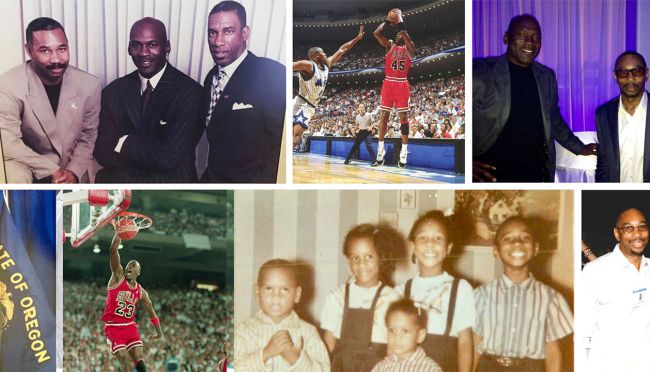
- 01 Jun 2023
- HBS Case
A Nike Executive Hid His Criminal Past to Turn His Life Around. What If He Didn't Have To?
Larry Miller committed murder as a teenager, but earned a college degree while serving time and set out to start a new life. Still, he had to conceal his record to get a job that would ultimately take him to the heights of sports marketing. A case study by Francesca Gino, Hise Gibson, and Frances Frei shows the barriers that formerly incarcerated Black men are up against and the potential talent they could bring to business.
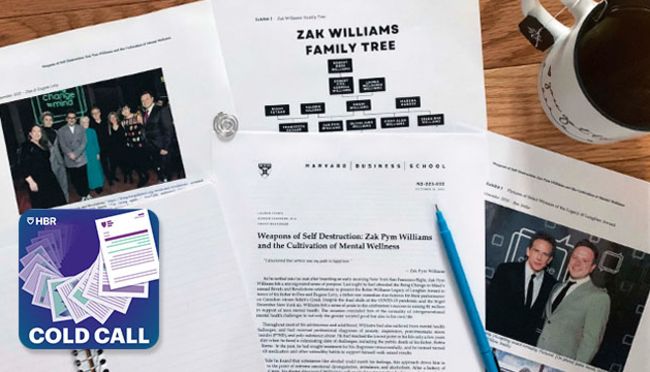
- 09 May 2023
- Cold Call Podcast
Can Robin Williams’ Son Help Other Families Heal Addiction and Depression?
Zak Pym Williams, son of comedian and actor Robin Williams, had seen how mental health challenges, such as addiction and depression, had affected past generations of his family. Williams was diagnosed with generalized anxiety disorder, depression, and post-traumatic stress disorder (PTSD) as a young adult and he wanted to break the cycle for his children. Although his children were still quite young, he began considering proactive strategies that could help his family’s mental health, and he wanted to share that knowledge with other families. But how can Williams help people actually take advantage of those mental health strategies and services? Professor Lauren Cohen discusses his case, “Weapons of Self Destruction: Zak Pym Williams and the Cultivation of Mental Wellness.”
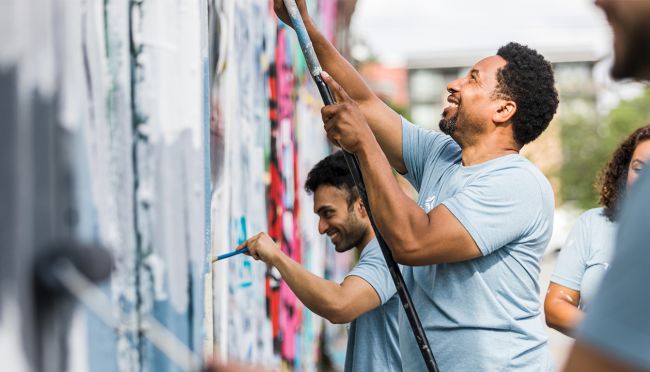
- 04 Apr 2023
- Book
Two Centuries of Business Leaders Who Took a Stand on Social Issues
Executives going back to George Cadbury and J. N. Tata have been trying to improve life for their workers and communities, according to the book Deeply Responsible Business: A Global History of Values-Driven Leadership by Geoffrey Jones. He highlights three practices that deeply responsible companies share.

- 14 Feb 2023
- HBS Case
Is Sweden Still 'Sweden'? A Liberal Utopia Grapples with an Identity Crisis
Changing political views and economic forces have threatened Sweden's image of liberal stability. Is it the end of the Scandinavian business-welfare model as we know it? In a case study, Debora Spar examines recent shifts in Sweden and what they mean for the country's future.

- 08 Dec 2022
- HBS Case
The War in Ukraine and Nestlé’s Moral Dilemma: Stay or Leave Russia?
Nestlé had to choose whether to leave Russia in protest and potentially deprive civilians of essential goods, such as baby formula, or stay and face global outrage. A case study by Nien-hê Hsieh explores this complex decision and offers advice for leaders weighing fraught questions.

- 10 Nov 2022
- Research & Ideas
Too Nice to Lead? Unpacking the Gender Stereotype That Holds Women Back
People mistakenly assume that women managers are more generous and fair when it comes to giving money, says research by Christine Exley. Could that misperception prevent companies from shrinking the gender pay gap?

- 09 Nov 2022
- In Practice
COP27: What Can Business Leaders Do to Fight Climate Change Now?
The US government plans to spend $370 billion to cut greenhouse gases and expand renewable energy—its biggest investment yet. In the wake of COP27, we asked Harvard Business School faculty members how executives could seize this moment.

- 08 Nov 2022
- Research & Ideas
How Centuries of Restrictions on Women Shed Light on Today's Abortion Debate
Going back to pre-industrial times, efforts to limit women's sexuality have had a simple motive: to keep them faithful to their spouses. Research by Anke Becker looks at the deep roots of these restrictions and their economic implications.

- 21 Oct 2022
- Research & Ideas
People Trust Business, But Expect CEOs to Drive Social Change
Companies should do more to confront climate change, labor market shifts, and racism, according to a survey of 14,000 people in 14 countries by the Institute for the Study of Business in Global Society and the Edelman Trust Institute. Is it time for more business leaders to step up?

- 17 Oct 2022
- Research & Ideas
Why Quiet Quitters Need More Than Money to Re-Engage
A hefty bonus might do little to inspire a truly checked-out employee. It's time for managers to genuinely connect with their colleagues, and build more community and meaning in the workplace, say Rawi Abdelal and Thomas DeLong.

- 11 Aug 2022
- Research & Ideas
When Parents Tell Kids to ‘Work Hard,’ Do They Send the Wrong Message?
It takes more than grit to succeed in a world rife with systemic inequity. So why don't we tell children that? Research by Ashley Whillans and colleagues shows how honest talk about social barriers could empower kids to break them down.

- 14 Jul 2022
- Research & Ideas
When the Rubber Meets the Road, Most Commuters Text and Email While Driving
Laws and grim warnings have done little to deter distracted driving. Commuters routinely use their time behind the wheel to catch up on emails, says research by Raffaella Sadun, Thomaz Teodorovicz, and colleagues. What will it take to make roads safer?
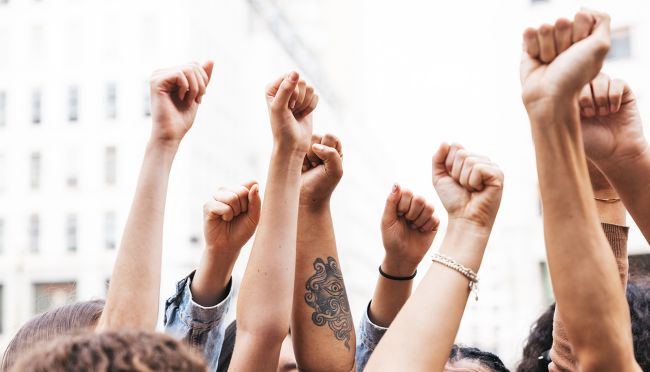
- 28 Jun 2022
- Book
The Moral Enterprise: How Two Companies Profit with Purpose
Despite polarized attitudes, Rebecca Henderson argues that it's the perfect time for companies to reset their moral compass. In an essay from the book A Political Economy of Justice, she explores the social efforts of Cadbury and Unilever.
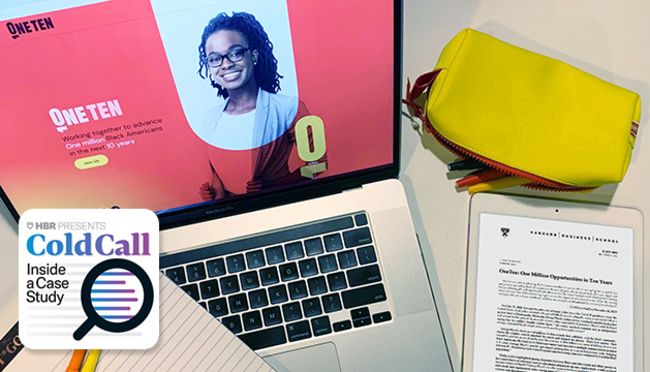
- 14 Jun 2022
- Cold Call Podcast
What Does It Take to Close the Opportunity Gap in America’s Labor Market?
In the wake of George Floyd’s killing and widespread protests for social justice in the United States, OneTen was formed by a coalition of 40 large companies to address the disparity in job opportunities for African Americans without four-year college degrees. Their goal was to provide one million jobs in 10 years. But in order to do that, OneTen had to analyze the underlying problems and formulate recommendations for both system-level problems and those that manifest themselves at an organizational level. Professor Kash Rangan and OneTen CEO Maurice Jones discuss OneTen’s approach in the case, “OneTen: One Million Opportunities in Ten Years.”
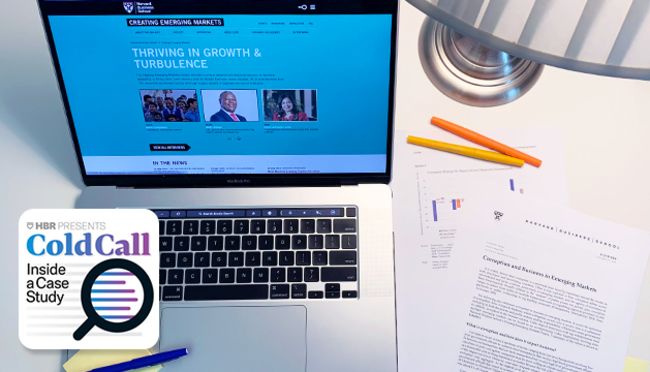
- 31 May 2022
- Cold Call Podcast
Corruption: New Insights for Fighting an Age-Old Business Problem
Corruption is as old as humanity, with cases documented as far back as the Egyptian dynasties. While the World Bank estimates that international bribery exceeds $1.5 trillion annually, the larger and more subtle effects of corruption on economies and populations is incalculable. Harvard Business School professors Geoff Jones and Tarun Khanna explore how corruption uniquely affects business in emerging markets, and why it should be addressed by the public and private sectors in their case, “Corruption and Business in Emerging Markets,” and companion video interviews with more than 100 iconic entrepreneurs in emerging markets.

- 03 May 2022
- Cold Call Podcast
Can a Social Entrepreneur End Homelessness in the US?
Community Solutions is a nonprofit founded in 2011 by Rosanne Haggerty, with the ambitious goal of ending chronic homelessness in America. Its “Built for Zero” methodology takes a public health approach, helping communities across the US use better data collection and outreach to improve government processes and piecemeal solutions. In 2021, Community Solutions was awarded a $100 million grant from the MacArthur Foundation, and Haggerty and her team had to decide how to prioritize projects and spending to maximize the grant’s impact. Should they continue to focus on unhoused veterans or expand their work to include families and youth in need of housing? Senior Lecturer Brian Trelstad discusses Haggerty’s approach in his case, "Community Solutions."

Amazon in Seattle: The Role of Business in Causing and Solving a Housing Crisis
In 2020, Amazon partnered with a nonprofit called Mary’s Place and used some of its own resources to build a shelter for women and families experiencing homelessness on its campus in Seattle. Yet critics argued that Amazon’s apparent charity was misplaced and that the company was actually making the problem worse. Paul Healy and Debora Spar explore the role business plays in addressing unhoused communities in the case “Hitting Home: Amazon and Mary’s Place.”